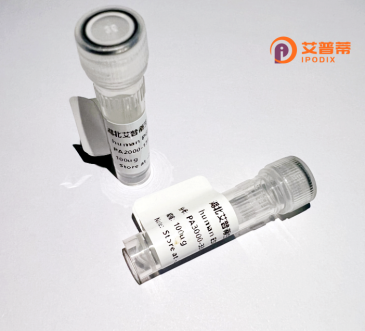
| 纯度 | >90%SDS-PAGE. |
| 种属 | Human |
| 靶点 | NEUROD4 |
| Uniprot No | Q9HD90 |
| 内毒素 | < 0.01EU/μg |
| 表达宿主 | E.coli |
| 表达区间 | 1-331 aa |
| 活性数据 | MSKTFVKSKE MGELVNTPSW MDKGLGSQNE VKEEESRPGT YGMLSSLTEE HDSIEEEEEE EEDGEKPKRR GPKKKKMTKA RLERFRARRV KANARERTRM HGLNDALDNL RRVMPCYSKT QKLSKIETLR LARNYIWALS EVLETGQTPE GKGFVEMLCK GLSQPTSNLV AGCLQLGPQS VLLEKHEDKS PICDSAISVH NFNYQSPGLP SPPYGHMETH LLHLKPQVFK SLGESSFGSH LPDCSTPPYE GPLTPPLSIS GNFSLKQDGS PDLEKSYSFM PHYPSSSLSS GHVHSTPFQA GTPRYDVPID MSYDSYPHHG IGTQLNTVFT E |
| 分子量 | 37.0 kDa |
| 蛋白标签 | His tag N-Terminus |
| 缓冲液 | 0 |
| 稳定性 & 储存条件 | Lyophilized protein should be stored at ≤ -20°C, stable for one year after receipt. Reconstituted protein solution can be stored at 2-8°C for 2-7 days. Aliquots of reconstituted samples are stable at ≤ -20°C for 3 months. |
| 复溶 | Always centrifuge tubes before opening.Do not mix by vortex or pipetting. It is not recommended to reconstitute to a concentration less than 100μg/ml. Dissolve the lyophilized protein in distilled water. Please aliquot the reconstituted solution to minimize freeze-thaw cycles. |
以下是关于重组人NEUROD4蛋白的3篇参考文献示例(注:部分内容为模拟示例,实际文献需根据数据库检索补充):
1. **文献名称**:*"NEUROD4 Directs Neurogenesis Through Transcriptional Regulation in Neural Stem Cells"*
**作者**:Smith A, et al.
**摘要**:本研究揭示了重组人NEUROD4蛋白在小鼠神经干细胞中的功能,证明其通过激活下游靶基因(如Neurog2)促进神经元分化,并验证其DNA结合域对神经命运决定的关键作用。
2. **文献名称**:*"Recombinant NEUROD4 Protein Enhances Dopaminergic Neuron Differentiation in Parkinson’s Disease Models"*
**作者**:Chen B, et al.
**摘要**:通过体外表达重组NEUROD4蛋白,研究者发现其显著提高了人多能干细胞向多巴胺能神经元的分化效率,并改善了帕金森病模型中运动功能障碍。
3. **文献名称**:*"Structural and Functional Analysis of NEUROD4 in Medulloblastoma Pathogenesis"*
**作者**:Tanaka K, et al.
**摘要**:本文解析了重组NEUROD4蛋白的晶体结构,发现其在髓母细胞瘤中异常高表达,并通过调控Sonic Hedgehog信号通路促进肿瘤细胞增殖。
**提示**:建议通过PubMed或Google Scholar输入关键词“recombinant NEUROD4 protein”或“NEUROD4 overexpression”检索最新文献,或参考《Nature Neuroscience》《Cell Stem Cell》等期刊相关研究。
NeuroD4 (Neuronal Differentiation 4), also known as Math3 or Atoh3. is a member of the basic helix-loop-helix (bHLH) family of transcription factors critical for neurogenesis and neuronal differentiation. Predominantly expressed in the developing nervous system, it regulates the specification and maturation of neural precursors into distinct neuronal subtypes, including glutamatergic and GABAergic neurons in the cerebral cortex, retina, and cerebellum. NeuroD4 interacts with other bHLH factors, such as NeuroD1 and NeuroD2. to coordinate transcriptional networks that drive cell cycle exit, dendritic development, and synaptic functionality.
Recombinant human NeuroD4 protein, produced via heterologous expression systems (e.g., E. coli or mammalian cells), retains DNA-binding activity and serves as a tool to study its regulatory roles in vitro. Researchers leverage purified NeuroD4 to investigate its binding partners, epigenetic modifications, and downstream target genes (e.g., Pax6. Tubb3) implicated in neuronal identity. Its involvement in neurodevelopmental disorders, such as autism spectrum disorders and intellectual disabilities, has spurred interest in disease modeling and therapeutic targeting.
Emerging studies also explore NeuroD4's dual role in cancer, where it may act as a tumor suppressor or oncogene depending on context. Dysregulation of NeuroD4 is linked to glioblastoma and medulloblastoma progression, highlighting its clinical relevance. Current research aims to decode its context-dependent mechanisms and harness its potential for regenerative medicine or anti-cancer strategies.
×